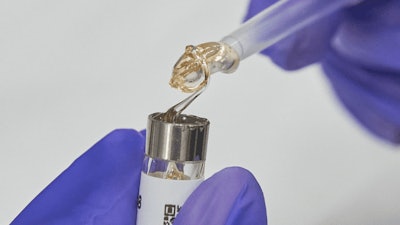
Editors Note: This article was originally published on Wednesday, Feb. 9, and was updated at 11:00 a.m. ET on Friday, Feb. 11, to reflect that while HHC has been claimed by many to be naturally occurring in trace amounts in cannabis, that has not been proven by peer-reviewed research.
The cannabinoid craze continues as HHC, chemically known as hexahydrocannabinol, has hit the scene as one of the latest hemp-derived newcomers.
Like delta-8 THC, delta-10 THC, and other related cannabinoids, many questions revolve around what HHC is, its legal status, where it comes from, and more.
While HHC seems to be emerging into the spotlight recently, it’s not exactly new.

The semi-synthetic compound was first discovered in the 1940s by a chemist named Roger Adams through a process called hydrogenation. Adams added two hydrogen molecules to delta-9 THC, the primary psychoactive compound found in cannabis, to convert THC to HHC, Way of Leaf reports.
While Adams synthesized HHC from cannabis-derived THC, today, it can also be converted from hemp-derived cannabinoids such as delta-8, according to Roger Brown, the president and founder of ACS Laboratory, a cannabis, hemp, and CBD testing laboratory in Florida.
How is HHC Made? Hydrogenation Explained.
HHC has been claimed by many to be naturally occurring in trace amounts in cannabis; however that has not been proven by peer-reviewed research. Therefore, all HHC on the market is currently derived through THC conversion or some other synthetic process.
HHC is most commonly converted in a laboratory using a hydrogenation process, which typically requires the addition of hydrogen and using a metal catalyst, like palladium, says Greg Gerdeman, Ph.D., cannabis scientist and educator and the co-founder of NASHCX (Nashville Commodities Exchange).
.png?auto=format%2Ccompress&fit=max&q=70&w=400)
Allison Justice, Ph.D., CEO of The Hemp Mine, a vertically integrated hemp CBD business in South Carolina, says the same hydrogenation process is used to make margarine, a common substitute for butter.
“Vegetable oil, when it’s hydrogenated, it becomes [margarine],” she says. “So, this process is used in products we consume on the daily. [However,] the process can be dangerous to those who aren’t qualified, [or] don’t have the right procedures or the right equipment.”
Gerdeman agrees, as he said in an email that “working with these reactions is serious chemistry.”
“The catalysts are considered ‘pyrophoric,’ which means they readily ignite in certain conditions,” he said, adding that processing HHC is an explosion hazard.
When making HHC, you typically start with a clean, purified cannabinoid like THC and put it into a reducing environment, Gerdeman says. “That leads to that hydrogenation in the presence of an appropriate solvent and a metal catalyst to improve the efficiency of the reaction,” he adds.
To better understand hydrogenation, let’s break down the meaning of “delta” in delta-8, “tetra” in tetrahydrocannabinol, and “hexa” in hexahydrocannabinol.
As previously reported by Hemp Grower, the chemical difference between delta-8 and delta-9 is where the double bond is located on the chain of carbon atoms. So, the “delta” in delta-8 simply refers to the position of where that double bond is located, Gerdeman says.
RELATED: Understanding Delta-8-THC: Where Does It Come From?
“‘Tetra’ [is the] prefix within THC [that] actually refers to four hydrogens that are partially saturating [a] ring [in the molecule],” Gerdeman said in an email. “Adding two more [hydrogens] makes the ring ‘hexa’ hydrogenated. In other words, all six carbons in the ring are fully saturated with hydrogens. This increases stability, but also changes how well the molecule can interact with the cannabinoid receptors.”
Is HHC Legal?
The legal status of HHC is currently ambiguous. Some say it’s legal if manufactured from a hemp-derived compound like delta-8, while others disagree.
“It should be illegal depending on what the starting material is,” says Dr. Ethan Russo, M.D., a board-certified neurologist and the CEO and founder of CReDO Science. “My position is that even the synthetically derived delta-8 that’s out there is illegal. [In the] original Controlled Substances Act of 1970, hemp fiber, for example, isn’t illegal, but once you start doing chemical extractions on it, it is. Delta-8 is an isomer of delta-9 THC. There is a 1986 congressional act called the [Federal] Analogue Act that says if you make a molecule related to something that’s a Schedule I [controlled substance], what you made also can be considered Schedule I and illegal.”
Russo says he’s the “last person interested in creating another prohibited drug.” However, he believes the sale of these unregulated products, which could expose consumers to potential toxicities, should not be allowed.
“The way to deal with this is to legalize cannabis and regulate the market,” Russo says.
.png?auto=format%2Ccompress&fit=max&q=70&w=400)
Unlike Russo, others argue that it’s federally legal because it’s a hemp derivative and therefore covered under the 2018 Farm Bill.
Nolan Jackson, an attorney at Frost Brown Todd who advises clients nationwide regarding hemp laws and regulations at the state and federal levels, and regulatory counsel to the U.S. Hemp Roundtable, sees both sides of the legal argument.
“The argument is that the 2018 Farm Bill defines ‘hemp’ to include all parts of the plant with a delta-9 THC concentration of 0.3% [THC] or less on a dry-weight basis, removes hemp from scheduling under the federal Controlled Substances Act, and protects hemp and hemp products in interstate commerce,” Jackson said in an email. “Because HHC is naturally occurring in the hemp plant, it constitutes ‘hemp’ under the 2018 Farm Bill, [and it is] is not a federal controlled substance and is protected in interstate commerce.”
Jackson also understands the counterargument, which is that since the 2018 Farm Bill was made to regulate and protect non-intoxicating hemp products, and HHC is considered intoxicating, it may not be deemed “hemp” under the bill.
“Many who worked on the 2018 Farm Bill will tell you that Congress did not—and could not—foresee the issue of intoxicating [hemp-derived] cannabinoids because the science and data at the time did not suggest that delta-9 THC and other non-intoxicating cannabinoids could be converted into intoxicating cannabinoids like delta-8 THC and HHC,” Jackson said in an email.
“There are other reasons why HHC might be illegal under federal law, including that it is or can be a synthetic cannabinoid or an analogue of another controlled substance,” he added. “Those arguments have been secondary to the argument about the spirit and intent of the 2018 Farm Bill, which has been the prevailing argument that I’ve seen.”
What Are the Effects of HHC?
Brown describes the effects of HHC as “a feeling of happiness, increased energy, [and] low level of euphoria.” However, he says he doesn’t think it is competitive with cannabis (with predominantly delta-9 THC) in terms of effects or medicinal benefits.
"We are in the process of conducting a survey of the reported effects based on the type of product people are using: 25mg gummy of HHC," Brown said in an email. "It's just anecdotal that the effects are of a mild psychedelic cannabinoid, however there have been no known published studies on humans."
.png?auto=format%2Ccompress&fit=max&q=70&w=400)
As far as potency, Gerdeman said in an email that HHC is less potent than delta-9, and potentially less potent than delta-8; however, that varies “because the chemistry that creates HHC is inconsistent across all methods,” he said.
"The way HHC binds to the endocannabinoid receptors is different from THC and similar to delta-8," Brown said in an email. "It's not about more or less potent, it's different–both the effects and different potency measures."
Because HHC is synthetic, Russo says individuals may even experience additional undesired side effects.
“The endocannabinoid system is very finely tuned,” Russo says. “THC on its own is actually too strong, … so it's called a weak agonist at the CB1 receptor. That means that its affinity for the receptor is low to middling."
“When you have something like the synthetic agonist or like HHC, it’s stronger than that, and it means that you’re very likely to get side effects, maybe even before you get the benefits,” Russo adds.
HHC does have one leg up on THC: it’s stability, says Gerdeman.
“By adding those two extra hydrogens, HHC has a full saturated ring structure, which is more stable for shelf live preservation,” Gerdeman said in an email. “To me, this is the most interesting and useful feature of HHC as a potential therapeutic.”
The Testing Process
Brown says ACS Laboratory is currently testing products for HHC every day, most commonly in the form of edibles or vaporizers.
“It’s really starting to move in the marketplace,” he says. “We test for it every single day from a potency level and also from other minor cannabinoids that are along with it, and also for the metals from the safety perspective,” he says.
Brown says he started receiving an "incredible" number of inquiries about HHC testing around October of last year, prompting the lab to start researching and developing a proper testing method for the cannabinoid.
He says the tests for HHC products are entirely different from the tests for delta-9 or delta-8. However, the goal for testing these products is the same: to ensure it is safe for consumption and doesn’t contain any residual metals, solvents, pesticides, etc.
The Future of Intoxicating Cannabinoids
Brown says he doesn’t necessarily think HHC presents a new market opportunity for businesses, but rather a market extension.
“It’s a little bit different than delta-8. I mean, delta-8 has been outlawed in [numerous] states. So, it just creates a market extension for those that have a distribution channel for delta-8 or for CBD hemp products, so it’s just another extension of the product line,” Brown says. However, he believes the market for cannabinoids like HHC, THC-O acetate, and delta-9 THC is “here to stay.”
RELATED: THC-O Acetate Q&A with Dr. Ethan Russo: ‘Don’t Go There'
Jackson, however, thinks the market opportunity for “intoxicating cannabinoids” is closing slowly.

“The opportunity that might exist now probably is not representative of future opportunity in 18, 12, or even 6 months,” Jackson said in an email. “I think it’s safe to predict that markets where intoxicating cannabinoid products can be sold freely and without restriction will be less by this time next year. There’s also the possibility of federal regulation on intoxicating cannabinoids.”
Jackson also suggests that a business engaging or looking to engage in intoxicating products should be cautious and “think about the claims it is making about the products and the truthfulness of its labeling and packaging.”
“Some companies have masqueraded intoxicating products as legitimate hemp products, which raises an ethics and fair competition issue that organizations like the U.S. Hemp Roundtable are fighting to address,” he added.
As this industry sector continues to emerge, Gerdeman says the legality of these cannabinoids will undoubtedly depend on the 2018 Farm Bill, which will undergo updates next year.
“Unless the farm bill in 2023 explicitly makes these things legal or confirms their legality or sort of renews their legality, then [these issues won’t] go away,” he says. “And I think that’ll be very interesting as different groups jockey to have a voice in the writing of that 2023 Farm Bill.”
Brown agrees, as he thinks several hemp derivatives that will have to be tackled on a one-on-one basis.
“Where they outlaw delta-8, then there’s delta-10, then there’s THCO- [acetate], then there’s HHC,” Brown says. “This is just a different derivative. … [And] this is something that the regulators will have to deal with on an ongoing basis. I don’t think it’s going to end.”


























